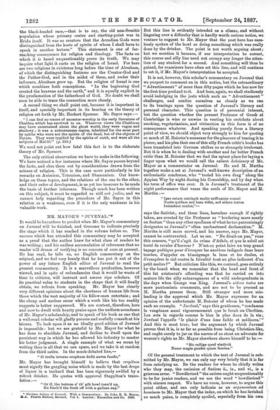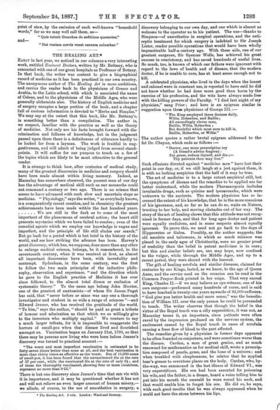MR. MAYOR'S " JIIVENAL."*
Ix would be hazardous to predict when Mr. Mayor's commentary on Juvenal will be finished, and tiresome to indicate precisely the stage which it has reached in the volume before us. The success which has attended this commentary may be accepted as a proof that the author knew for what class of readers he was writing ; and his endless accumulation of references that no reader will dream of verifying is no concern of ours at present. He has read, he tells us, no English commentary on the original, and we feel very keenly that he has put it out of the power of any future English editor of Juvenal to read the present commentary. It is a marvellous production, however viewed, and in spite of redundancies that it would be waste of time to criticise, will instruct and amuse ripe scholars. Of its practical value to students in the shape that it will finally obtain, we refrain from speaking. Mr. Mayor has clearly very different opinions about the shortness of human life from those which the vast majority of his fellow-men entertain; and the cheap and useless sneer which a work like his too readily suggests is better suppressed. We are content, therefore, here and now to dwell with hearty praise upon the uniform soundness of Mr. Mayor's scholarship, and to speak of his book as one that a well-read scholar will gladly possess and usefully consult at his leisure. To look upon it as an ideally good edition of Juvenal is impossible : but we are grateful to Mr. Mayor for what he has done to elucidate javenal, and decline to dwell upon the persistent way in which he has allowed his industry to master his better judgment. A single example of what we mean by writing thus is all that we can spare, and we take it at random from the third satire. In the much-debated line,- " Si trails inverso orepitum dedit aurea fundo,"
Mr. Mayor has brought himself to believe that crepitum must signify the gargling noise which is made by the last drops of liquor in a tankard that has been vigorously swilled by a robust drinker. He quotes with approval Stapylton's trans- lation :-
" Or if, the bottom o' th' gilt bowl tnrn'd up, He fetoh'd the froth off with a gallant sup."
• Thirteen Satires of Juvenal. With a Commentary. By John E. B. Mayor, K.A. Fourth Edition, Reveled. VoL I. London Macmillan and Co. MIK
But this line is evidently intended as a climax, and without lingering over a difficulty that is hardly worth serious notice, we venture to suggest to Mr. Mayor that the poet here haa care- lessly spoken of the bowl as doing something which was really done by the drinker. The point is not worth arguing about ; but we mention it because, if our interpretation be correct, this coarse and silly line need not occupy any longer the atten- tion of any student for a second. And something will thus be gained, for examiners have often set this line, and will continue to set it, if Mr. Mayor's interpretation be accepted.
It is not, however, this scholar's commentary on Juvenal that we purport to comment on in this notice, but the extraordinary " Advertisement" of more than fifty pages which he has now for the first time prefixed to it. And here, again, we shall studiously avoid indulging in the jests which such an " Advertisement " challenges, and confine ourselves as closely aa we can to its bearings upon the question of Juvenal's literary and personal character. This question is of perennial interest, but the question whether the present Professor of Greek at Cambridge is wise or unwise in venting his crotchets about smoking, vegetarianism, and vivisection in this form is of no consequence whatever. And speaking purely from a literary point of view, we should object very strongly to him for quoting so much of M. Boissier's nonsense for the pleasure of tearing it to pieces; and his plea that one of this silly French critic's books has been translated into German strikes us as strangely irrelevant. But it is when he is dealing with another and far better French critic than M. Boissier that we find the aptest place for laying a finger upon what we would call the salient deficiency of Mr. Mayor as a commentator on Juvenal. He and M. Martha together make a set at Javenal's well-known description of an enthusiastic coachman, who " tooled his own drag" along the Appian Way by night during his Consulship, and by day when his term of office was over. It is Juvenal's treatment of the night performance that vexes the souls of Mr. Mayor and M. Martha :— " Ipso totem astringit malts sufilamine consul
Hoots quidam sed lung videt, sed eidera testes Intendant oculos,"—
says the Satirist; and these lines, harmless enough if rightly taken, are scouted by the Professor as " bordering more nearly on fustian" than any other specimen of what he too patronisingly designates as Juvenal's " often unchastened declamation." M. Martha is still more moved, and his answer, says Mr. Mayor, cannot be controverted. Let us see. " Ne disait-on pas," runs this censure, "qu'il s'agit du crime d'Athee, et quo le soleil eet tentd de reculer d'horrear P N'est-cs point faire nu trop grand tapage podtique pour d'evoquer lee ancatres indignds dame lears tombes, d'appeler en temoignage la lune et lee etoiles, et d'exaspdrer le Mel contre la frivolitd tout an plus indiscret d'un petit maitre P" But criticism like this, we contend, goes entirely by the board when we remember that the head and front of this fat aristocrat's offending was that he carried on into mature life the silly extravagances of a wild undergraduate in the days when George was King. Javenal's sidera testes are mere pantomimic ornaments, and are not to be pressed as M. Martha presses them. Still stranger and more mis- leading is the approval which Mr. Mayor expresses for an opinion of the unfortunate M. Boissier of whom he has made such an example. "Juvenal," says this gentlemen, " condamne la vengeance anssi vigoureasement quo le ferait nn Chretien. Les sots in regarde comme le bien To plus door de la vie ; Invenal l'appelle ' le plaisir d'une hale faible et mediocre.' " And this is most true; but the argument by which Juvenal proves that it is, is as far as possible from being Christian-like, and ought surely to jar on the nerves of so stout an advocate for women's rights as Mr. Mayor elsewhere shows himself to be :— "Sip oollige good windiest Nemo magic gandet quern femina."
Of the general treatment to which the text of Juvenal is sub- mitted by Mr. Mayor, we can only say very briefly that it is far from satisfying us. Be the readers for whom he chiefly writes who they may, the omission of Satires ii., ix., and vi., ie a grievous error. " Bowdlerised " the satires ought unquestionably to be for junior readers, and we use the word " bowdlerised" with sincere respect. We have no room, however, to argue this point either, and can only indicate as an argumentum ad hominews to Mr. Mayor that the index, on which he has lavished so much pains, is completely spoiled, especially from his own
point of view, by the omission of such well-known "household words," for so we may well call them, as- " Quin baler% Gracchos de seditious querentes,"
and-
" Hat veniam oarvis vexat censors oolnmbas."



































 Previous page
Previous page